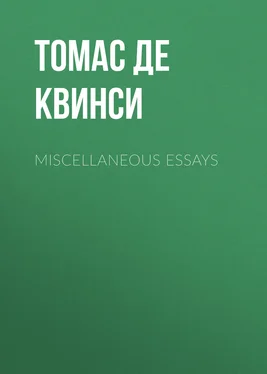Томас Де Квинси - Miscellaneous Essays
Здесь есть возможность читать онлайн «Томас Де Квинси - Miscellaneous Essays» — ознакомительный отрывок электронной книги совершенно бесплатно, а после прочтения отрывка купить полную версию. В некоторых случаях можно слушать аудио, скачать через торрент в формате fb2 и присутствует краткое содержание. Жанр: foreign_prose, literature_19, foreign_antique, на английском языке. Описание произведения, (предисловие) а так же отзывы посетителей доступны на портале библиотеки ЛибКат.
- Название:Miscellaneous Essays
- Автор:
- Жанр:
- Год:неизвестен
- ISBN:нет данных
- Рейтинг книги:3 / 5. Голосов: 1
-
Избранное:Добавить в избранное
- Отзывы:
-
Ваша оценка:
- 60
- 1
- 2
- 3
- 4
- 5
Miscellaneous Essays: краткое содержание, описание и аннотация
Предлагаем к чтению аннотацию, описание, краткое содержание или предисловие (зависит от того, что написал сам автор книги «Miscellaneous Essays»). Если вы не нашли необходимую информацию о книге — напишите в комментариях, мы постараемся отыскать её.
Miscellaneous Essays — читать онлайн ознакомительный отрывок
Ниже представлен текст книги, разбитый по страницам. Система сохранения места последней прочитанной страницы, позволяет с удобством читать онлайн бесплатно книгу «Miscellaneous Essays», без необходимости каждый раз заново искать на чём Вы остановились. Поставьте закладку, и сможете в любой момент перейти на страницу, на которой закончили чтение.
Интервал:
Закладка:
Thomas De Quincey
Miscellaneous Essays
ON
THE KNOCKING AT THE GATE,
IN MACBETH
From my boyish days I had always felt a great perplexity on one point in Macbeth. It was this: the knocking at the gate, which succeeds to the murder of Duncan, produced to my feelings an effect for which I never could account. The effect was, that it reflected back upon the murder a peculiar awfulness and a depth of solemnity; yet, however obstinately I endeavored with my understanding to comprehend this, for many years I never could see why it should produce such an effect.
Here I pause for one moment, to exhort the reader never to pay any attention to his understanding when it stands in opposition to any other faculty of his mind. The mere understanding, however useful and indispensable, is the meanest faculty in the human mind, and the most to be distrusted; and yet the great majority of people trust to nothing else; which may do for ordinary life, but not for philosophical purposes. Of this out of ten thousand instances that I might produce, I will cite one. Ask of any person whatsoever, who is not previously prepared for the demand by a knowledge of perspective, to draw in the rudest way the commonest appearance which depends upon the laws of that science; as for instance, to represent the effect of two walls standing at right angles to each other, or the appearance of the houses on each side of a street, as seen by a person looking down the street from one extremity. Now in all cases, unless the person has happened to observe in pictures how it is that artists produce these effects, he will be utterly unable to make the smallest approximation to it. Yet why? For he has actually seen the effect every day of his life. The reason is—that he allows his understanding to overrule his eyes. His understanding, which includes no intuitive knowledge of the laws of vision, can furnish him with no reason why a line which is known and can be proved to be a horizontal line, should not appear a horizontal line; a line that made any angle with the perpendicular less than a right angle, would seem to him to indicate that his houses were all tumbling down together. Accordingly he makes the line of his houses a horizontal line, and fails of course to produce the effect demanded. Here then is one instance out of many, in which not only the understanding is allowed to overrule the eyes, but where the understanding is positively allowed to obliterate the eyes as it were, for not only does the man believe the evidence of his understanding in opposition to that of his eyes, but, (what is monstrous!) the idiot is not aware that his eyes ever gave such evidence. He does not know that he has seen (and therefore quoad his consciousness has not seen) that which he has seen every day of his life. But to return from this digression, my understanding could furnish no reason why the knocking at the gate in Macbeth should produce any effect, direct or reflected. In fact, my understanding said positively that it could not produce any effect. But I knew better; I felt that it did; and I waited and clung to the problem until further knowledge should enable me to solve it. At length, in 1812, Mr. Williams made his début on the stage of Ratcliffe Highway, and executed those unparalleled murders which have procured for him such a brilliant and undying reputation. On which murders, by the way, I must observe, that in one respect they have had an ill effect, by making the connoisseur in murder very fastidious in his taste, and dissatisfied by anything that has been since done in that line. All other murders look pale by the deep crimson of his; and, as an amateur once said to me in a querulous tone, "There has been absolutely nothing doing since his time, or nothing that's worth speaking of." But this is wrong; for it is unreasonable to expect all men to be great artists, and born with the genius of Mr. Williams. Now it will be remembered that in the first of these murders, (that of the Marrs,) the same incident (of a knocking at the door soon after the work of extermination was complete) did actually occur, which the genius of Shakspeare has invented; and all good judges, and the most eminent dilettanti, acknowledged the felicity of Shakspeare's suggestion as soon as it was actually realized. Here, then, was a fresh proof that I was right in relying on my own feeling in opposition to my understanding; and I again set myself to study the problem; at length I solved it to my own satisfaction; and my solution is this. Murder in ordinary cases, where the sympathy is wholly directed to the case of the murdered person, is an incident of coarse and vulgar horror; and for this reason, that it flings the interest exclusively upon the natural but ignoble instinct by which we cleave to life; an instinct, which, as being indispensable to the primal law of self-preservation, is the same in kind, (though different in degree,) amongst all living creatures; this instinct therefore, because it annihilates all distinctions, and degrades the greatest of men to the level of "the poor beetle that we tread on," exhibits human nature in its most abject and humiliating attitude. Such an attitude would little suit the purposes of the poet. What then must he do? He must throw the interest on the murderer. Our sympathy must be with him ; (of course I mean a sympathy of comprehension, a sympathy by which we enter into his feelings, and are made to understand them,—not a sympathy 1 1 It seems almost ludicrous to guard and explain my use of a word in a situation where it would naturally explain itself. But it has become necessary to do so, in consequence of the unscholarlike use of the word sympathy, at present so general, by which, instead of taking it in its proper sense, as the act of reproducing in our minds the feelings of another, whether for hatred, indignation, love, pity, or approbation, it is made a mere synonyme of the word pity ; and hence, instead of saying "sympathy with another," many writers adopt the monstrous barbarism of "sympathy for another."
of pity or approbation.) In the murdered person all strife of thought, all flux and reflux of passion and of purpose, are crushed by one overwhelming panic; the fear of instant death smites him "with its petrific mace." But in the murderer, such a murderer as a poet will condescend to, there must be raging some great storm of passion,—jealousy, ambition, vengeance, hatred,—which will create a hell within him; and into this hell we are to look.
In Macbeth, for the sake of gratifying his own enormous and teeming faculty of creation, Shakspeare has introduced two murderers: and, as usual in his hands, they are remarkably discriminated: but, though in Macbeth the strife of mind is greater than in his wife, the tiger spirit not so awake, and his feelings caught chiefly by contagion from her,—yet, as both were finally involved in the guilt of murder, the murderous mind of necessity is finally to be presumed in both. This was to be expressed; and on its own account, as well as to make it a more proportionable antagonist to the unoffending nature of their victim, "the gracious Duncan," and adequately to expound "the deep damnation of his taking off," this was to be expressed with peculiar energy. We were to be made to feel that the human nature, i.e. , the divine nature of love and mercy, spread through the hearts of all creatures, and seldom utterly withdrawn from man,—was gone, vanished, extinct; and that the fiendish nature had taken its place. And, as this effect is marvellously accomplished in the dialogues and soliloquies themselves, so it is finally consummated by the expedient under consideration; and it is to this that I now solicit the reader's attention. If the reader has ever witnessed a wife, daughter, or sister, in a fainting fit, he may chance to have observed that the most affecting moment in such a spectacle, is
Читать дальшеИнтервал:
Закладка:
Похожие книги на «Miscellaneous Essays»
Представляем Вашему вниманию похожие книги на «Miscellaneous Essays» списком для выбора. Мы отобрали схожую по названию и смыслу литературу в надежде предоставить читателям больше вариантов отыскать новые, интересные, ещё непрочитанные произведения.
Обсуждение, отзывы о книге «Miscellaneous Essays» и просто собственные мнения читателей. Оставьте ваши комментарии, напишите, что Вы думаете о произведении, его смысле или главных героях. Укажите что конкретно понравилось, а что нет, и почему Вы так считаете.












